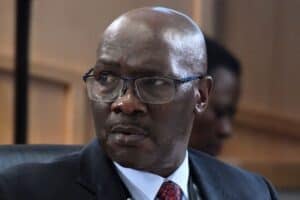The waters might appear muddied and the constitution inadequate in that it does not prohibit unfit or compromised individuals from going to parliament to make laws, but right and wrong remain as such

After an eventful week in which a leaked affidavit detailing how the looting of the VBS Mutual Bank dominated the headlines, South Africans were left in no doubt about the moral compass of the people they elected to craft the laws of the land and lead the country to a better future.
Before VBS scandal took centre stage, the country was caught up in a heated debate about whether John Hlophe, uMkhonto weSizwe (MK) party leader in parliament and an impeached judge, could sit on the Judicial Service Commission and take part in selecting judges for the bench from which he was removed by parliament.
ALSO READ: MK party slams DA and NGOs opposed to Hlophe’s JSC designation
If there is one thing that former president Jacob Zuma has done perfectly in his less than perfect journey in politics, it is to expose the imperfections in this country’s constitution.
There is no way that those who crafted the constitution could have foreseen that a judge who was deemed to be ethically compromised and had been correctly removed from office would somehow circumvent the whole system and end up in a position where he contributes to the process of selecting new judges.
Because of that, they did not put laws in place to govern such a possibility and Zuma’s MK party is testing the limits of that omission.
When advocate Terry Motau released the explosive report into the looting at VBS six years ago, the public got a glimpse of what was to come.
Among those compromised who had supposedly received money not due to them were EFF leader Julius Malema and his deputy Floyd Shivambu.
The denials were quick and vociferous. And those who vote for them and hold them in high regard asked the question: where is the proof? Have they been convicted in a court of law?
Former VBS chair Tshifhiwa Matodzi’s affidavit provides the proof. But more worryingly, it provides a chilling reason for why these opposition leaders in parliament accepted VBS money.
ALSO READ: EFF willing to pay back donations ‘traced to any criminal activity’ – Mpofu on VBS
They were doing so to stop the noise they were making about Zuma’s R7.5 million bond that he had received from the bank to settle his Nkandla debt.
Effectively, they seemingly accepted money to be less effective as opposition leaders, a role they had been elected to office to fulfil in an honest manner.
Just like in Hlophe’s case, there is nothing in law that says that the EFF leaders are not fit to be in parliament. Just like Dr Zweli Mkhize of the ANC, who also appears in the affidavit.
They, like Hlophe, will continue to craft laws that govern how South Africans must lead their daily lives. Because there is no law that says they cannot.
And they are not going to take part in ensuring that such laws are added into the constitution because they will be effectively working themselves out of their jobs.
No politician will ever surrender their power voluntarily. The waters might appear muddied and the constitution inadequate in that it does not prohibit unfit or compromised individuals from going to parliament to make laws, but right and wrong remain as such. It is wrong to accept money to go against an oath of office.
It is wrong for a judge to seek to influence other judges to make judgements in favour of any individual. Such people should not be in parliament making laws to govern the lives of ordinary people.
And if parliament is to cleanse itself and reclaim its honour, it will work to ensure all its members are worthy of being its members.






